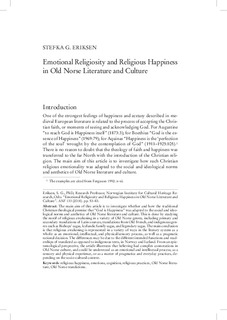Emotional Religiosity and Religious Happiness in Old Norse Literature and Culture
Journal article, Peer reviewed
Accepted version
Permanent lenke
http://hdl.handle.net/11250/2590668Utgivelsesdato
2018Metadata
Vis full innførselSamlinger
Originalversjon
Arkiv för nordisk filologi. 2018, 133 53-83.Sammendrag
The main aim of this article is to investigate whether and how the traditional Christian theological premise that “God is Happiness” was adapted to the social and ideological norms and aesthetics of Old Norse literature and culture. This is done by studying the motif of religious awakening in a variety of Old Norse genres, including primary and secondary translations of Latin sources, translations from Old French, and indigenous genres such as Bishops’ sagas, Icelandic family sagas, and legendary sagas. The main conclusion is that religious awakening is represented in a variety of ways in the literary system as a whole: as an emotional, intellectual, and physical/sensory process, as well as a pragmatic rational decision. The differences may be due to the different intended functions and readerships of translated as opposed to indigenous texts, in Norway and Iceland. From an epistemological perspective, the article illustrates that believing had complex connotations in Old Norse culture, and could be understood as an emotional and intellectual process, as a sensory and physical experience, or as a matter of pragmatics and everyday practices, depending on the socio-cultural context.
Beskrivelse
Embargo until 1 January 2022
